BestReviews is reader-supported and may earn an affiliate commission. Details
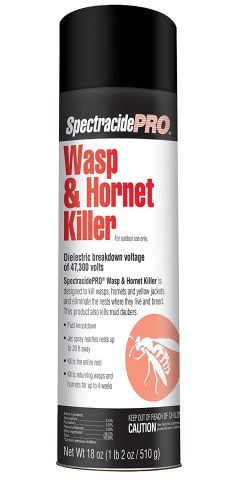
An effective spray for wasps that continues working after you spray.
An effective spray for wasps that continues working after you spray.
Sprays up to 20 feet and kills wasps quickly. Also prevents wasps and hornets from returning for up to 4 weeks. Easily kills entire nests of wasps.
A little pricier than other wasp sprays.
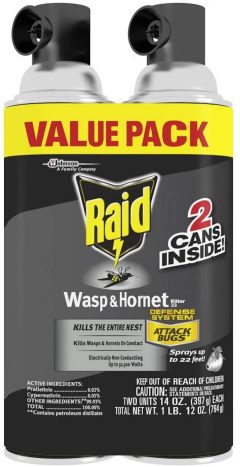
A 2-pack of insecticide that kills immediately and can handle an entire nest.
A 2-pack of insecticide that kills immediately and can handle an entire nest.
Comes with 2 14-ounce cans of spray. Liquid can reach 22-feet away. Works on yellow jackets, paper wasps, bald-face hornets, and mud daubers.
Toxic to fish and should not be sprayed near water.

Consider this product if you need a wasp spray to eliminate an entire nest.
Consider this product if you need a wasp spray to eliminate an entire nest.
Formulated for nests, this spray produces a dense foam that covers quickly and kills on contact. Foam traps wasps and spreads to an entire nest for reliable results.
Somewhat messy to use. The claim of a 21-foot range is questionable.
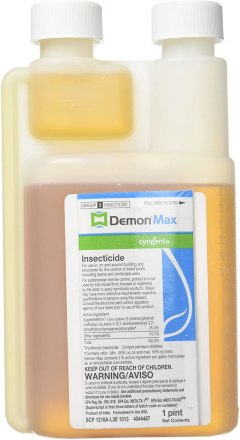
Professional-grade spray that effectively kills wasps and keeps them away.
Professional-grade spray that effectively kills wasps and keeps them away.
Makes up to 32 gallons of spray, so the bottle lasts a long time. Protects against wasps for a long time after spraying. Does not go into water supplies.
Has a strong smell and doesn't kill wasps immediately.
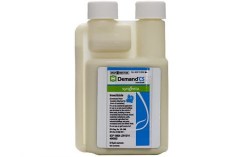
A professional-grade insecticide that works well against wasps.
A professional-grade insecticide that works well against wasps.
Great for indoor and outdoor use and keeps wasps away for several weeks after spraying. The concentrated formula needs to be diluted and lasts a long time.
Some buyers received bottles that were leaking.

We recommend these products based on an intensive research process that's designed to cut through the noise and find the top products in this space. Guided by experts, we spend hours looking into the factors that matter, to bring you these selections.
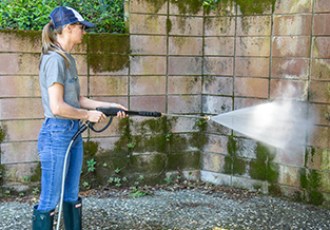
Like many people who care about the environment, you might be on a mission to save bees. However, not all insects that fly and buzz are the same. Although closely related to bees, wasps are more dangerous and aggressive. That’s why it may be necessary to kill them and their nests when they get too close to humans. A wasp spray makes it easy to accomplish this task.
Wasp spray is made with insecticides that kill these insects quickly. It can be used on individual wasps but is commonly applied to nests to destroy the whole colony. Many wasp sprays are also used to kill hornets, yellow jackets and other types of wasps and insects.
Whether a nest is in the ground or built in eaves, trees or shrubs, a residential wasp spray like our favorite, Spectracide Pro Wasp and Hornet Killer, comes in a can that sprays 20 feet or more. This makes it possible to stand at a safe distance while applying it. If you need a spray for a persistent wasp problem or professional-level applications, a concentrated commercial formula might be best.
Spectracide’s wasp and hornet spray earns our top spot for being highly effective at killing wasps, hornets, yellow jackets and more while providing lasting protection. Formulated with a combination of quality pesticides, it comes in a generous 18-ounce can with a nozzle that sends the product up to 20 feet. This is a good distance for safely eliminating entire nests. After spraying a wasp nest, the last thing you want is for the pests to return. This spray alleviates that concern by keeping them away for at least four weeks. And because it easily kills whole nests, it’s a great product for major pest problems.
This wasp and hornet spray is made by a brand you probably already know and trust. Raid has earned a reputation for making insecticides that reliably kill all types of crawling and flying pests. This spray targets different types of wasps, hornets, mud daubers and yellow jackets. It kills them quickly and eliminates whole nests. The spray can reach 22 feet, so you can take out pests and their homes without getting too close. And if getting a good deal is one of your goals, you’ll appreciate this product’s reasonable cost and unbeatable value. That’s because it includes two 14-ounce cans for an appealing price.
This Ortho hornet and wasp spray has a foamy consistency that reaches up to 20 feet to cover and trap wasps, resulting in their demise. Wasps that return to the nest are killed once they encounter the dense foam too. The nozzle dispenses the foam in a precise pinpoint pattern, so it’s a good choice for nests located in hard to reach areas. This product is also effective at killing hornets, yellow jackets and mud daubers. The 16-ounce can comes at an appealing price.
This Syngenta product is a concentrated, commercial-grade insecticide that’s mixed with water to create a spray. The 16-ounce bottle makes up to 32 gallons of spray, which is ideal for consumers who need more than just one can of standard wasp spray. The powerful insecticides kill on contact, so it’s also the perfect pick for major pest problems. This versatile product kills 30 other types of insects, including termites, and provides lasting protection against future infestations in treated areas. Unlike many other wasp sprays, it can also be applied in some cracks and crevices in indoor areas when used as directed.
The Syngenta Demand CS insecticide is another versatile concentrated product that can be used to kill numerous types of pests. In addition to wasps and hornets, it can eliminate fleas, flies, ticks, ants and more. Another selling point is that this commercial-grade formula can be used in certain areas inside the home. However, it’s important to always follow the instructions to use the product safely. Mixed with water, one 8-ounce bottle can make 40 gallons of spray, making this a solid value for any consumer who needs to use a wasp spray frequently.
This foaming Black Flag wasp and hornet spray will give you confidence that it will do its job. It’s made by a top brand in pest killers and formulated with powerful pesticides that kill wasps, hornets, spiders, ants and more in seconds. In addition to killing pests quickly, the thick consistency of this foam traps them too. It also lingers to eliminate wasps that return to the nest. What’s more, the spray leaves the 14-ounce can at a force that sends it 20 feet, so you don’t have to get close to the stinging pests. If you aren’t happy with the performance of this wasp spray, you can take advantage of the money-back guarantee offered by the manufacturer.
BASF PT Wasp-Freeze II insecticide is formulated with powerful ingredients that kill pests on contact as well as whole nests quickly and effectively. It also continues to kill wasps and hornets that return to the nest for several days after application. This aerosol spray reaches targets up to 15 feet away. The 17.5-ounce can contains enough spray to go a long way toward eliminating stubborn wasp and hornet nests.
Wasp spray is formulated with pesticides that target the nervous system of the flying pests to kill them quickly and effectively. Natural pyrethrins derived from chrysanthemum plants and synthetic pyrethroids made from chemicals are the two most popular categories of pesticides used to make these sprays.
Wasp spray is commonly used on nests to kill entire colonies. However, some residential formulas can also be used to spray the occasional single intruder in your outdoor living space. While most of these sprays are marketed to kill wasps and hornets, some are effective at killing other flying pests. Keep in mind that hornets and yellow jackets are also wasps, and the terms are often used interchangeably.
An important consideration when shopping for wasp spray is how the spray is sold. You can purchase residential versions that are ready to use or commercial versions that come in concentrated form.
Residential: This type of wasp and hornet spray comes ready to use without any mixing or additional containers. This is the easiest option to use and the most readily available. It typically comes in an aerosol spray can with a trigger on the top. Although liquid is the most popular form, foam pesticides are also available. Some people prefer foam because it’s easier to see than a clear liquid. Foam also traps the insects against the nest. Standard formulas are powerful enough to eliminate most wasp problems. However, there are sprays with higher concentrations of pesticide chemicals available. These are the best options for larger nests or recurring colonies of wasps and hornets.
Wasp spray is easy to use. When you press the trigger button, it ejects the spray through a narrow nozzle. This design allows you to spray the chemical accurately over some distance, which should be printed on the can. The farther away you can stand from the wasps, the safer you’ll be.
Commercial: Commercial sprays ship in a concentrated form in a large bottle. You mix the concentrated liquid chemicals with water to create the wasp spray. You must provide the spraying mechanism when using this product. Some commercial sprays use cypermethrin to kill wasps, which works more quickly than the chemicals in residential sprays. It keeps other wasps away from the area for a longer period too.
Most wasp sprays are made to use outdoors and shouldn’t be sprayed indoors. However, some formulas are safe to use indoors, especially concentrated commercial products. To be safe, always read the instructions carefully before using any wasp spray indoors. Never use one inside that’s only intended for outdoor use.
Quantity: Pay attention to the amount of spray contained in the aerosol can. Some cans may contain 12 or 14 ounces while others hold up to 20 ounces. If you’re interested in comparing prices accurately, do the math and figure out the cost per ounce.
Reach: Wasps are aggressive, so it’s safest to stand as far as possible from them when spraying a nest. Fortunately most cans of wasp spray are designed to reach a distance of 20 feet or more.
Spraying a wasp or hornet nest won’t necessarily kill all the insects that live in it. That’s why it’s important that you choose a wasp spray that’s potent enough to linger and kill the pests that return to the nest later. Most brands are formulated to do this with a consistency and chemicals that produce a residue that continues to kill wasps and hornets for hours or days after application.
A. Residential wasp spray in cans is quite affordable. You can expect to pay between $4 and $10 for a single can with a standard pesticide formula. If you need a stronger spray for a stubborn wasp infestation, you’ll pay about $20 to $30 per can. Multipacks containing two to a dozen cans will save you some money. Concentrated commercial formulas cost between $30 and $40 for a bottle that makes 30 to 40 gallons of spray.
A. Wasps are least active early in the morning, just before sunset and when temperatures are lower. These insects are extremely active in the middle of the day when temperatures are high. Try to use the spray when the wasps are less active. It’s safer for you because wasps that escape the spray will be less likely to attack you.
A. If you see wasps crawling around a nest, it’s active. Sometimes wasps start to build a nest in a certain spot before giving up and moving to a new location. If you don’t see wasps actively crawling on an unfinished, open nest, you can knock it down without having to use spray. Treat any enclosed, finished nest as active even if you don’t see wasps.
A. Any can of consumer-level wasp spray should indicate the distance for safe use. The farther away you stand, the less accurate you’ll be. On the other hand, swarming wasps are more likely to sting you if you’re close to the nest and you miss them with the spray. Stand near the limit of the recommended distance.
A. Wasp spray is an insecticide, meaning it contains poisonous chemicals and should be handled with care. Don’t use it around pets, pet food or water. Move potted plants away from the area. If any of the spray contacts your skin, wash the area thoroughly. If you’re worried about residue near the sprayed nest, wash the area a few hours after application with warm water, soap and a sponge or scrub brush.
Get emails you’ll love.
Learn about the products you’re wondering if you should buy and get advice on using your latest purchases.
